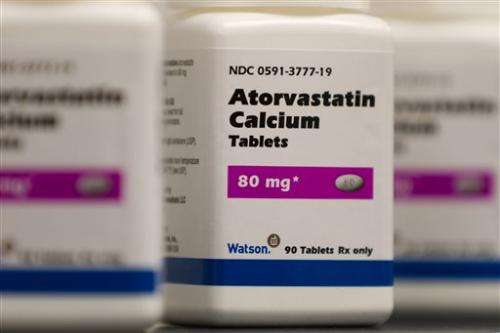US doctors urge wider use of cholesterol drugs

US doctors are calling for the wider use of cholesterol-fighting statin drugs to prevent heart attacks and strokes.
The first new U.S. heart disease prevention guidelines in a decade also take a very different approach than the traditional method, focusing more broadly on risk and moving away from specific numerical targets for cholesterol.
The guidance offers doctors a new formula for estimating risk that includes age, gender, race and factors such as whether someone smokes.
And for the first time, the guidelines take aim at preventing strokes, not just heart attacks. Partly because of that, they set a lower threshold for using medicines to reduce risk. They recommend using statin drugs such as Lipitor and Zocor, and identify four groups of people they help the most.
The end result: Twice as many Americans—one-third of all U.S. adults—would be told to consider taking statins, which lower cholesterol but also reduce heart risks in other ways.
"The emphasis is to try to treat more appropriately," said Dr. Neil Stone, the Northwestern University doctor who headed the cholesterol guideline panel. "We're going to give statins to those who are the most likely to benefit."
Doctors say the new approach will limit how many people are put on statins simply because of a cholesterol number. Yet under the new advice, one-third of U.S. adults—44 percent of men and 22 percent of women—would meet the threshold to consider taking a statin. Under the current guidelines, statins are recommended for only about 15 percent of adults.
Heart disease is the leading cause of death worldwide. High cholesterol leads to hardened arteries that can cause a heart attack or stroke. Most cholesterol is made by the liver, so diet changes have a limited effect on it.
The guidelines were issued Tuesday by the American Heart Association and American College of Cardiology. Some doctors not involved in writing the guidance worry that it will be tough to understand.
"It will be controversial, there's no question about it. For as long as I remember, we've told physicians and patients we should treat their cholesterol to certain goal levels," said the Cleveland Clinic's Dr. Steven Nissen. "There is concern that there will be a lot of confusion about what to do."
The government's National Heart, Lung and Blood Institute appointed expert panels to write the new guidelines in 2008, but in June said it would leave drafting them to the medical groups. New guidelines on lifestyle and obesity also came out Tuesday, and ones on blood pressure are coming soon.
Roughly half the cholesterol panel members have financial ties to makers of heart drugs, but panel leaders said no one with industry connections could vote on the recommendations.
Current guidelines say total cholesterol should be under 200, and LDL, or "bad cholesterol," under 100. Other drugs such as niacin and fibrates are sometimes added to statins to try to reach those goals, but studies show they don't always lower the chances of heart problems.
"Chasing numbers can lead us to using drugs that haven't been proven to help patients. You can make someone's lab test look better without making them better," said Yale University cardiologist Dr. Harlan Krumholz, who has long urged the broader risk approach the new guidelines take.
Despite a small increased risk of muscle problems and accelerating diabetes in patients already at risk for it, statins are "remarkably safe drugs" whose benefits outweigh their risks, said Dr. Donald Lloyd-Jones, preventive-medicine chief at Northwestern.
The patents on Lipitor, Zocor and other statins have expired, and they are widely available in generic versions for as little as a dime a day. One that is still under patent protection is AstraZeneca's Crestor, which had sales of $8.3 billion in 2012.
Aspirin—widely used to lower the risk of strokes and heart attacks—is not addressed in the guidelines. And many drugs other than statins are still recommended for certain people, such as those with high triglycerides.
Patients should not stop taking any heart drug without first checking with their doctor.
The guidelines also say that adults 40 to 79 should get an estimate every four to six years of their chances of suffering a heart attack or stroke over the next decade using the new formula. It includes age, sex, race, cholesterol, blood pressure, diabetes and smoking. If risk remains unclear, doctors can consider family history or three other tests. The best one is a coronary artery calcium test, an X-ray to measure calcium in heart arteries.
___
Marilynn Marchione can be followed at twitter.com/MMarchioneAP .
© 2013 The Associated Press. All rights reserved.

















